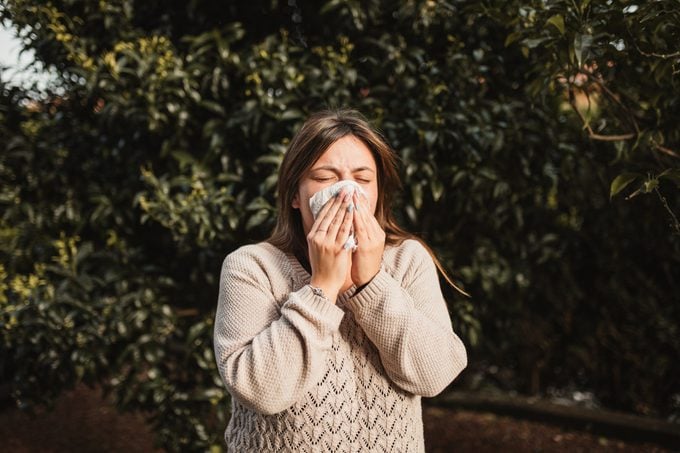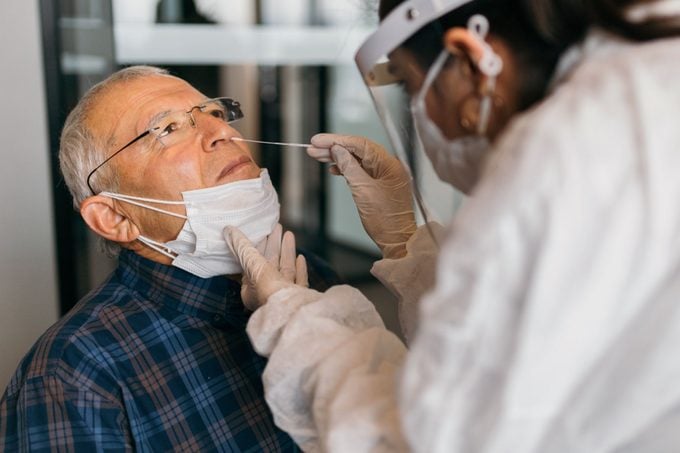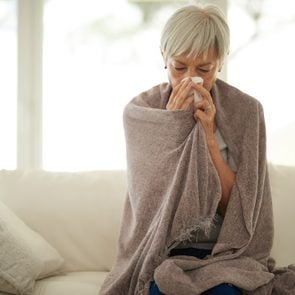What Happens If You Get Covid After the Vaccine
Updated: Aug. 24, 2021
Breakthrough Covid-19 infections happen, but they're a tiny fraction of overall cases. Here's what to expect if it happens to you.
Covid-19 vaccines and infections
When Tom Frederking, 61, of Plainville, Kansas, became fully vaccinated in February, he recalled that he “felt that I had a security blanket thrown over me.”
Frederking is a cancer survivor and was concerned he’d be at greater risk of problems if he got infected.
When he developed a breakthrough Covid infection in August, he did end up having an infusion of protective monoclonal antibodies to help fight off the infection. However, he didn’t end up in the hospital and was able to recuperate at home.
“Through all of this, the only real thing that I’ve had is the congestion,” he says. “I did not lose my sense of smell. I did not lose my sense of taste. I have not had a headache.”
Although it’s not the case for everyone who gets Covid-19 after being vaccinated, his symptoms where relatively mild.
“I’m most definitely glad that I got [the vaccine],” he says. “In fact, I’m telling other people to get it.”
Now that there are Covid-19 vaccines, people talk about Covid-19 breakthrough infections, defined as a positive test 14 days or more after being fully vaccinated.
But what’s it like to actually have one? We asked experts all your questions about breakthrough infections. Plus, why it’s still important to get vaccinated, wear masks, and socially distance.
(Read about Covid-19 vaccine myths no one should fall for.)

You belong to a very small club
As of July 26, more than 7,500 people who have been vaccinated have ended up in the hospital or died from a breakthrough Covid infection.
While that may seem high, it’s only a fraction of the 167 million people who, like Frederking, are fully vaccinated. And it’s vastly smaller than the more than 600,000 unvaccinated people in the United States who have died of Covid-19 since the start of the pandemic.
“The current breakthrough numbers for Covid are closer to 0.01 percent, which is amazingly low,” says Beth Oller, MD, Frederking’s family physician, based in Stockton, Kansas.
The reason you hear so much about outbreaks is that the denominator, meaning the overall number of people who have gotten shots, is huge, notes William Schaffner, MD, an infectious diseases expert at Vanderbilt University in Nashville.
The more vaccinated people, the greater the number of breakthrough infections. As a percentage, though, it’s still tiny.
You shouldn’t be surprised
Tori Gleason, 41, got her shots in December and January. As a healthcare provider herself (she is a chiropractor in rural western Kansas), she knew from the get-go that she still had a chance of becoming infected.
Gleason felt “like crud” for five days and says her case was probably moderate rather than mild. She was happy she’d been vaccinated.
“I really believe [that] had I not been vaccinated, they would be planning my funeral,” says Gleason. “It really underscores for me the necessary nature of getting vaccinated.”
In clinical trials, the Moderna and Pfizer mRNA vaccines were a whopping 95 percent effective at preventing illness, especially severe illness. They’re “spectacularly effective,” confirms Dr. Schaffner.
But they’re still not 100 percent. Compare that to the annual flu shot, which hovers around 50 percent and, like all vaccines, also has breakthrough infections.
Clinical trials look at generally healthy people who are not necessarily representative of the “real” world.
“They exclude people who don’t have normal immune systems or who are on immunosuppressant drugs,” says S. Wesley Long, MD, PhD, medical director of diagnostic microbiology at Houston Methodist. “You’re trying to determine the best conditions under which the vaccine will work.”
Once the vaccines get to the general population, the equation can change.
Even if vaccinated, the same exposures are a risk
Whether or not you’ve had the vaccine, the same things that put you at risk at the beginning of the pandemic are a problem now—namely being too close to other people and not wearing masks.
Frederking thinks he was infected during an outing with close family members, two of whom were pregnant and not vaccinated. (The CDC recommends that people who are pregnant get the Covid-19 vaccine. It helps protect both the mother and baby after birth as protective antibodies are passed through the placenta.)
With another grandchild on the way, Frederking and his wife had been careful; they were wearing masks in general and limiting where they go. After all of this, he still got Covid.
Gleason thinks she was infected during a 45-minute meeting with an old friend and member of the community.
“I let my guard down,” she says.
(Here are places you’re more likely to contract Covid-19.)
You may not get that sick
Many people who get a breakthrough infection will only have mild symptoms. This was certainly Frederking’s experience, and although Gleason’s symptoms were worse, she was able to recuperate at home and didn’t end up in the hospital.
Your risk of having more severe symptoms is higher if you have a weakened immune system, are older than 65, have conditions like high blood pressure or diabetes, or are overweight.
As many as a third of patients with breakthrough infections have no symptoms at all, according to the American Medical Association.
Meanwhile, only about 0.004 percent of vaccinated people get breakthrough cases that require hospitalization, and an even smaller percentage of those have died, adds Dr. Oller.
“The key point is that the vaccines are still very very good at preventing hospitalization and severe disease and death,” Dr. Long says.
You may already have been vulnerable
Frederking knew that his Covid-19 vaccine might not give him full protection because he had been treated for cancer, which can weaken your immune system and make you more vulnerable to infections.
He was also on ongoing immunotherapy for cancer, and he did not have as strong of an immune response as others to the vaccine.
“The severe breakthrough infections that we see tend to be in older people and those who are more vulnerable because of their immunocompetence,” says Schaffner.
In one study in the journal Clinical Microbiology and Infection, virtually all patients who landed in the hospital with breakthrough infections had a preexisting condition like hypertension or diabetes.
In a CDC sample of breakthrough infections that were either fatal or involved hospitalization, 74 percent were in people 65 or older.
These same people were already at a higher risk for complications from the virus.
As new coronavirus variants emerge, experts debate whether or not a Covid-19 vaccine booster shot is necessary.
On August 13, the U.S. Food and Drug Administration authorized Covid-19 booster shots for certain immunocompromised individuals, saying a third shot could increase protection.
However, fully vaccinated people who are not immunocompromised aren’t yet eligible for a booster shot.
You may or may not have the Delta variant
Neither Gleason nor Frederking knows if they had the Delta variant, which now causes most Covid-19 cases in the United States.
The existing Covid vaccines are effective against Delta, but the variant spreads so easily that it likely is resulting in more breakthrough infections.
“Delta is that it’s so incredibly contagious it’s running through unvaccinated people, and there will be spillover into people who are vaccinated,” says Dr. Schaffner.

You still need to get tested
“If you think you have a breakthrough infection, or even if you think there is a high likelihood you have been exposed, please get tested,” says Dr. Oller. “The best way we can keep this virus from continuing to spread is by knowing if we need to isolate.”
Vaccinated people infected with the virus that causes Covid-19 can still pass it on to others, although “you carry the virus for a shorter period of time,” says Dr. Schaffner.
Both Frederking and Gleason have stayed at home since they learned they had Covid-19. Dr. Oller’s advice is to follow local health department guidelines for quarantining.
Find out how long you can test positive after an infection.
Contact your doctor
Although most people with breakthrough infections won’t get that sick, you should still check in with your healthcare provider.
That doesn’t mean actually going into the office where you could spread the virus even further. Gleason set up a telehealth visit, though a phone call might also be enough.
Your healthcare provider can help you monitor the severity of the infection and, if needed, arrange for hospitalization.
Gleason managed her symptoms at home with over-the-counter medications. Frederking mostly stayed at home but, because of his underlying illness, did go into an office to get an infusion of monoclonal antibodies. These boost your immune system to better fight the infection.
Masks and social distancing can still protect you
In July, the CDC updated its mask guidance to say even fully vaccinated people should wear them indoors in public places where the virus is still widespread.
For Gleason, “it’s going to be a mask everywhere if I’m out in public with others and avoiding large gatherings.”
“With the surge of the Delta variant, and how much easier it is to contract, I absolutely think that we should be wearing masks when we are in public, in large gatherings, or around others who aren’t vaccinated or whose vaccination status we don’t know,” stresses Dr. Oller.
(Learn about five reasons to wear a mask that aren’t Covid-19.)
The vaccine is still worth it
Take it not just from the experts but from two people who actually went through the experience.
Frederking is “a believer in the shot,” as is Gleason.
Vaccination is our best defense against Covid but, the more layers of protection you have in place, the less likely you are to get infected, according to Dr. Oller.
“Vaccination, masking, avoiding large crowds-layering; all of these things together decrease risk,” Dr. Oller says. The decision to get a vaccine, she adds, “can literally be a matter of life or death.”
(Find out what eight people say about what it’s like to get the vaccine.)



